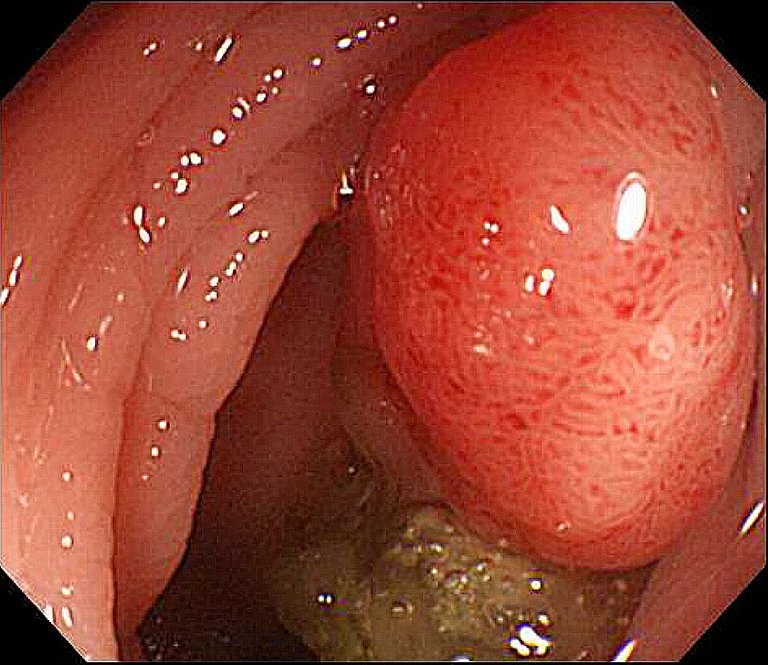The Dangerous Effect of Colon Cancer.
Learning and sharing about bladder cancer was eye-opening for me, we get to hear about the common ones like breast cancer but diving deep into understanding that different types are even more deadly is sad. So, I decided to study even further and understand the different existing types and the damage they could cause to the human body.
Colon cancer affects the colon, the colon is the first and the longest part of the large intestine, and this large intestine is the last part of the digestive system, of course we know how relevant the digestive system is, as its function is to break down food for the body's use, so we can only imagine how much side effect it has on the body once it happens.

source
Colon cancer can affect anyone at any age but it is more typical to affect older adults, usually starting as a mall clumps of cells called polyps that form inside the colon, now these polyps are generally non-cancerous, but as time goes on, they can turn into colon cancers.
When polyps occur, they do not usually have any symptoms, so regular screening is usually recommended by medical experts to figure out the presence of polyps in the colon. At the time when polyps are found and removed, there is a prevention of colon cancer.
Eventually, when colon cancer begins to show its symptoms, it would be dependent on its size as well as the location of the large intestine, generally, people come up with symptoms like;
- Rectal bleeding or blood in the stool.
- Constant body weakness.
- Losing weight without any viable reason.
- Change in bowel habits, constipation, and diarrhea become more frequent.
- Discomfort in the stomach region.
- Constant feeling that the bowel doesn't empty itself after using the restroom
- Bloated stomach.
There are five stages of colon cancer;
The first stage is stage 0, which healthcare providers refer to as ''carcinoma in situ'', this is an abnormal precancerous cell stage in the mucosa, the innermost layer of the colon wall.
The next stage is colorectal cancer, which is when the cancer has grown into the intestine wall but has not spread beyond the muscular coat.
Stage II of cancer has spread deeper into the wall of your intestine but has not yet spread to the lymph nodes nearby. There are three types of stage II colon cancer;
Stage IIA, the cancer has spread through most of the colon wall but has not grown into the outer wall of the layer.
Stage IIB has the cancer spread to the outer layer of the colon wall or through the wall.
Stage IIC is when the cancer has spread to a nearby organ.

source
At stage III, the colon cancer has spread to the lymph nodes, and there are three sub-stages too.
Stage IIIA has the cancer in the first or second layer of the colon wall, and has it spread to one to four lymph nodes.
At Stage IIIB, the cancer has affected more layers of the colon wall but only affects about one to three lymph nodes.
Stage IIIC has cancer in the outer layer of the colon, when cancer spreads into a nearby organ and one or more lymph nodes, it is called stag IIIC colon cancer.
Stage IV of colon cancer has spread to other areas of the body like the lungs, liver, or ovaries. It also has three sub-stages;
Stage IVA has cancer spread to one organ or to the lymph nodes that are more distant from the colon.
Stage IVB has the cancer being moved to a distant organ and more lymph nodes.
Stage IVC cancer affects distant organs, lymph nodes, and abdominal tissue.
Researchers have not been able to find a strong reason to attach the development of colon cancer, but they know about the possible risk factors that could trigger it, the fact that a person has more than one risk factor does not mean it will happen, but these risk factors and symptoms will help you discuss with your doctor about the chances of developing colon cancer and how best to avoid it. Below, are listed factors that can increase a person's chance of developing colon cancer;
Black people who live in the United States have been known to be at a greater risk compared to people of other races.
Age bracket of over 50 years stand a higher chance of having colon cancer, but more people even younger have started developing it too strangely, and doctors do not even have an explanation for it yet.
Inflammatory bowel disease is a condition that causes pain and swelling of the intestine, this can increase the chances of colon cancer.
A previous history of colon cancer will most likely spike its occurrence again.
When a blood relative has colon cancer, it is most likely that you will also get it.
Consuming meals low in fiber and high in fat and calories, some studies also show in addition that people who consume lots of red meat and processed meat are more at risk of developing colon cancer.
Not exercising at all will increase your chances of developing colon cancer.
Previous radiation therapy directed toward the abdomen, increases the possibility of colon cancer.
Smokers and excessive drinkers also stand a high chance.
Obesity is also a strong trigger for colon cancer.
Making realistic lifestyle changes daily will reduce the chances of colon cancer;
Consuming lots of fruits, vegetables, and whole grains.
Limiting the intake of alcohol.
Regular exercise.
Quit smoking.
Maintain a healthy weight.
Keep track of previous family occurrences.
Surgery is usually the most common treatment for colon cancer, we have; polypectomy, partial colectomy, radiofrequency ablation, and surgical reuction with colostomy.
References.
https://www.mayoclinic.org/diseases-conditions/colon-cancer/symptoms-causes/syc-20353669
https://www.cancer.org/cancer/types/colon-rectal-cancer/about/what-is-colorectal-cancer.html
https://my.clevelandclinic.org/health/diseases/14501-colorectal-colon-cancer

Hi, I am Tobi a writer, speaker, relationship blogger, and lover of good music. I love making friends and learning from people. If you want to hear me speak on relationships and general life issues, you can find my YouTube channel where you can watch any episode for free, please do not forget to subscribe, friends. I sincerely appreciate every love I get from here, Kindly do well to keep them coming.
Thanks for your contribution to the STEMsocial community. Feel free to join us on discord to get to know the rest of us!
Please consider delegating to the @stemsocial account (85% of the curation rewards are returned).
Thanks for including @stemsocial as a beneficiary, which gives you stronger support.
Congratulations @oluwatobiloba! You have completed the following achievement on the Hive blockchain And have been rewarded with New badge(s)
Your next target is to reach 150000 upvotes.
You can view your badges on your board and compare yourself to others in the Ranking
If you no longer want to receive notifications, reply to this comment with the word
STOPCheck out our last posts: